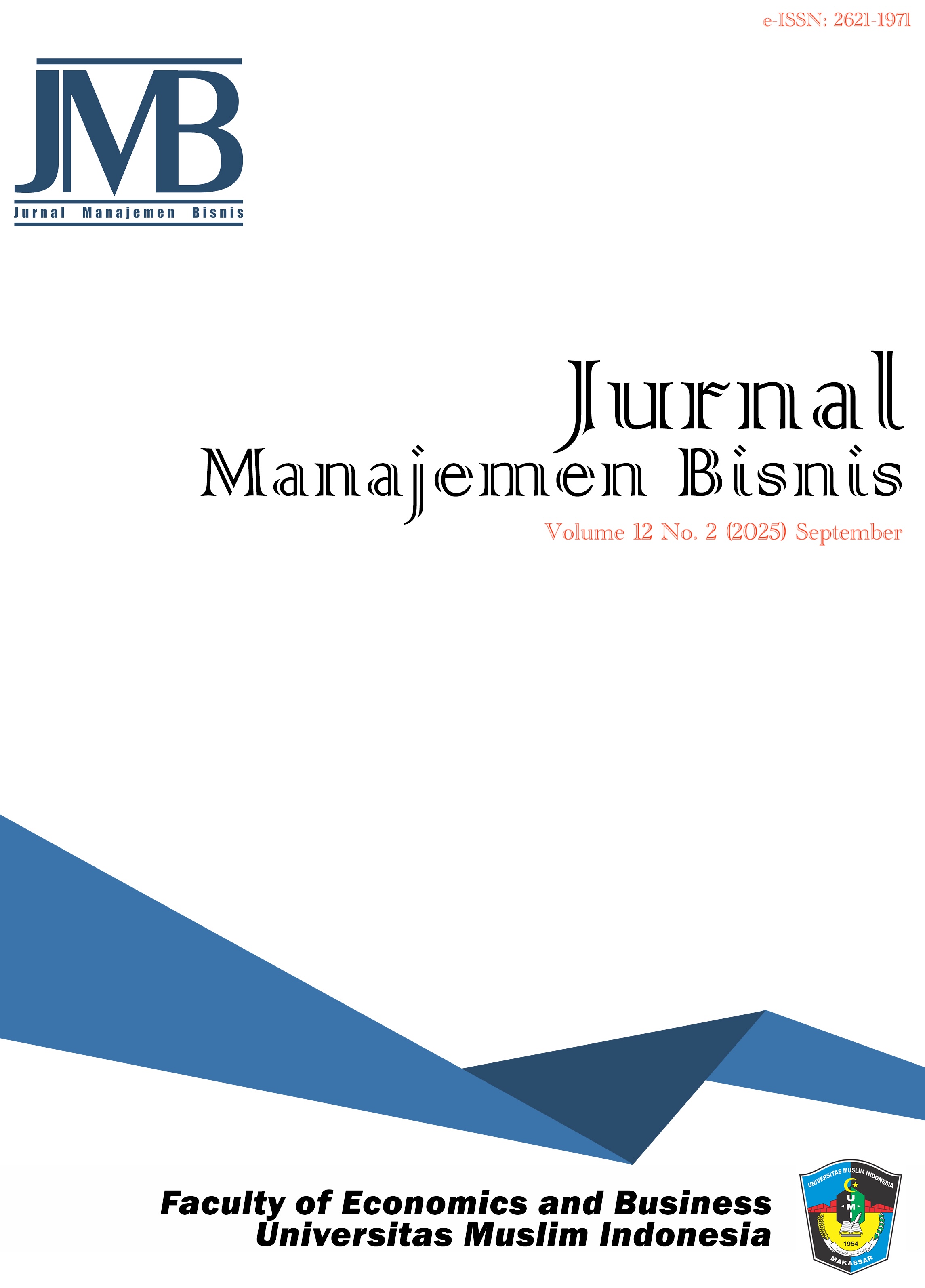Work Meaning and Justice in Gen Z: The Mediating Role of Engagement in Turnover Intention
DOI:
https://doi.org/10.33096/jmb.v12i2.1156Keywords:
Meaningful Work, Perceived Organizational Justice, Turnover Intention, Work Engagement, Generation ZAbstract
Turnover intention among Generation Z employees has emerged as a new challenge in human resource management, yet limited research has examined the roles of meaningful work and perceived organizational justice in this context. This study aims to investigate the influence of these two factors on turnover intention, with work engagement as a mediating variable. Using data from 506 Generation Z respondents and analyzed through Covariance-Based Structural Equation Modelling (CB-SEM) with LISREL, the findings reveal that meaningful work unexpectedly increases turnover intention, while perceived organizational justice shows a negative but non-significant effect. Work engagement fully mediates the relationship between both independent variables and turnover intention. These results suggest that work engagement plays a critical role in retaining Gen Z employees even when they perceive their work as meaningful or fair. This study contributes theoretically to the understanding of turnover intention among the emerging Gen Z workforce and offers practical insights for organizations to enhance employee retention by fostering engagement and aligning work meaning with individual values. Future research is recommended to focus on specific industries to strengthen contextual relevance.
Downloads
References
Allan, B. A. (2017). Task significance and meaningful work: A longitudinal study. Journal of Vocational Behavior, 102, 174–182. https://doi.org/10.1016/j.jvb.2017.07.011
Allan, B. A., Batz-Barbarich, C., Sterling, H. M., & Tay, L. (2019). Outcomes of meaningful work: A meta‐analysis. Journal of Management Studies, 56(3), 500–528. https://doi.org/10.1111/joms.12406
Bhaimiya, S. (2023, November 3). Gen Z expect to change careers 3 times throughout their lives - once more than any other generation: Survey. Business Insider. https://www.businessinsider.com/gen-z-like-to-job-hop-change-career-survey-2023-11#:~:text=Gen%20Z%20workers%20are%20known,three%20times%20over%20their%20lifetimes
Bińczycki, B., Łukasiński, W., & Dorocki, S. (2023). Determinants of motivation to work in terms of Industry 4.0—The Gen Z perspective. Sustainability, 15(15), 12069. https://doi.org/10.3390/su151512069
Colquitt, J. A., Scott, B. A., Rodell, J. B., Long, D. M., Zapata, C. P., Conlon, D. E., & Wesson, M. J. (2013). Justice at the millennium, a decade later: A meta-analytic test of social exchange and affect-based perspectives. Journal of Applied Psychology, 98(2), 199–236. https://doi.org/10.1037/a0031757
Erdogan, B., & Bauer, T. N. (2021). Overqualification, perceived fit, and work outcomes: The moderating role of meaningfulness at work. Journal of Managerial Psychology, 36(2), 141–155. https://doi.org/10.1108/JMP-05-2020-0213
Garai-Fodor, M., Varga, J., & Csiszárik-Kocsir, Á. (2021). Correlation between Generation Z in Hungary and the motivating factors to do volunteer work in a value-based approach. Sustainability, 13(20), 11519. https://doi.org/10.3390/su132011519
Godden, B. (2004). Sample size formulas. Journal of Statistics, 3, 66.
Hair, J. F., Babin, B. J., Black, W. C., & Anderson, R. E. (2019). Multivariate data analysis. Cengage. https://books.google.co.id/books?id=0R9ZswEACAAJ
Hall, J. (2022, October 12). The cost of turnover can kill your business and make things less fun. Forbes. https://www.forbes.com/sites/johnhall/2019/05/09/the-cost-of-turnover-can-kill-your-business-and-make-things-less-fun/
Han, S.-H., Sung, M., & Suh, B. (2020). Linking meaningfulness to work outcomes through job characteristics and work engagement. Human Resource Development International, 24(1), 3–22. https://doi.org/10.1080/13678868.2020.1744999
Hanina, T. (2022, April 1). [INFOGRAFIS] Fenomena job hopping kaum millennials, masih ada stigma? IDN Times. https://www.idntimes.com/life/career/tyas-hanina-1/fenomena-job-hopping-bagi-kaum-millennials
Huang, X., Li, Z., & Wan, Q. (2019). From organisational justice to turnover intention among community nurses: A mediating model. Journal of Clinical Nursing, 28(21–22), 3957–3965. https://doi.org/10.1111/jocn.15031
Jiang, Z., & Lavaysse, L. M. (2022). Psychological contract breach and employee turnover intention: A meta-analytic review. Journal of Vocational Behavior, 135, 103709. https://doi.org/10.1016/j.jvb.2022.103709
Kurniawan, A. B. (2024, August 4). Bagaimanakah sosok Gen Z Indonesia saat ini? Kompas.id. https://www.kompas.id/baca/humaniora/2024/08/04/bagaimanakah-sosok-gen-z-indonesia-saat-ini
Magrizos, S., Roumpi, D., Georgiadou, A., Kostopoulos, I., & Vrontis, D. (2022). The dark side of meaningful work-from-home: A nonlinear approach. European Management Review, 20(2), 227–244. https://doi.org/10.1111/emre.12534
Moon, K.-K. (2017). Fairness at the organizational level: Examining the effect of organizational justice climate on collective turnover rates and organizational performance. Public Personnel Management, 46(2), 118–143. https://doi.org/10.1177/0091026017702610
Moon, K.-K., Lim, J., & Kim, J.-S. (2024). Examining the effect of organizational justice on turnover intention and the moderating role of generational differences: Evidence from Korean public employees. Sustainability, 16(6), 2454. https://doi.org/10.3390/su16062454
Nasir, M., Syahnur, M. H., & Hasan, M. (2022). Faktor yang Mempengaruhi Turnover Intention Karyawan (Studi Kasus : PT. BANK SYARIAH INDONESIA, Tbk KC MAKASSAR 2). JMBI UNSRAT (Jurnal Ilmiah Manajemen Bisnis Dan Inovasi Universitas Sam Ratulangi)., 9(1). https://doi.org/10.35794/jmbi.v9i1.37470
Nurfajrina, A. (2023). Turnover adalah? Ini arti, penyebab, dampak, hingga cara menguranginya. Detikfinance. https://finance.detik.com/berita-ekonomi-bisnis/d-6985768/turnover-adalah-ini-arti-penyebab-dampak-hingga-cara-menguranginya
Oprea, B., Păduraru, L., & Iliescu, D. (2020). Job crafting and intent to leave: The mediating role of meaningful work and engagement. Journal of Career Development, 49(1), 188–201. https://doi.org/10.1177/0894845320918666
Pasaman, K. A., & Heriyanto, D. (2024). Indonesia Gen Z report 2024. IDN Times. https://cdn.idntimes.com/content-documents/indonesia-gen-z-report-2024.pdf
Pawar, J., & Pandit, R. S. (2023). A study on the trend in job hopping post pandemic among Millennials and Gen Z. PARIDNYA – The MIBM Research Journal, 9(1), 1–12.
Perreira, T. A., Berta, W., & Herbert, M. (2018). The employee retention triad in health care: Exploring relationships amongst organisational justice, affective commitment and turnover intention. Journal of Clinical Nursing, 27(7–8). https://doi.org/10.1111/jocn.14263
Pierce, J. L., Jussila, I., & Cummings, A. (2008). Psychological ownership within the job design context: Revision of the job characteristics model. Journal of Organizational Behavior, 30(4), 477–496. https://doi.org/10.1002/job.550
Ria, S. Y. (2024, June 4). Fenomena job hopping Gen Z jadi penyebab tingginya pengangguran di Bantul. Solopos.com. https://jogja.solopos.com/fenomena-job-hopping-gen-z-jadi-penyebab-tingginya-pengangguran-di-bantul-1934426
Siahaan, F. L., & Gatari, E. (2020). Searching for meaning: The mediating role of work engagement in the relationship between meaningful work and turnover intention of millennials. Psikohumaniora: Jurnal Penelitian Psikologi, 5(1), 15. https://doi.org/10.21580/pjpp.v5i1.4305
Vaamonde, J. D., Omar, A., & Salessi, S. (2018). From organizational justice perceptions to turnover intentions: The mediating effects of burnout and job satisfaction. Europe’s Journal of Psychology, 14(3), 554–570. https://doi.org/10.5964/ejop.v14i3.1490
Zhang, M., Song, Y., & Hackett, R. D. (2022). Perceived overqualification and turnover intention: The mediating role of psychological contract breach and the moderating role of job embeddedness. Journal of Occupational and Organizational Psychology, 95(1), 1–22. https://doi.org/10.1111/joop.12365
Downloads
Published
Issue
Section
License
Copyright (c) 2025 Jurnal Manajemen Bisnis

This work is licensed under a Creative Commons Attribution 4.0 International License.






